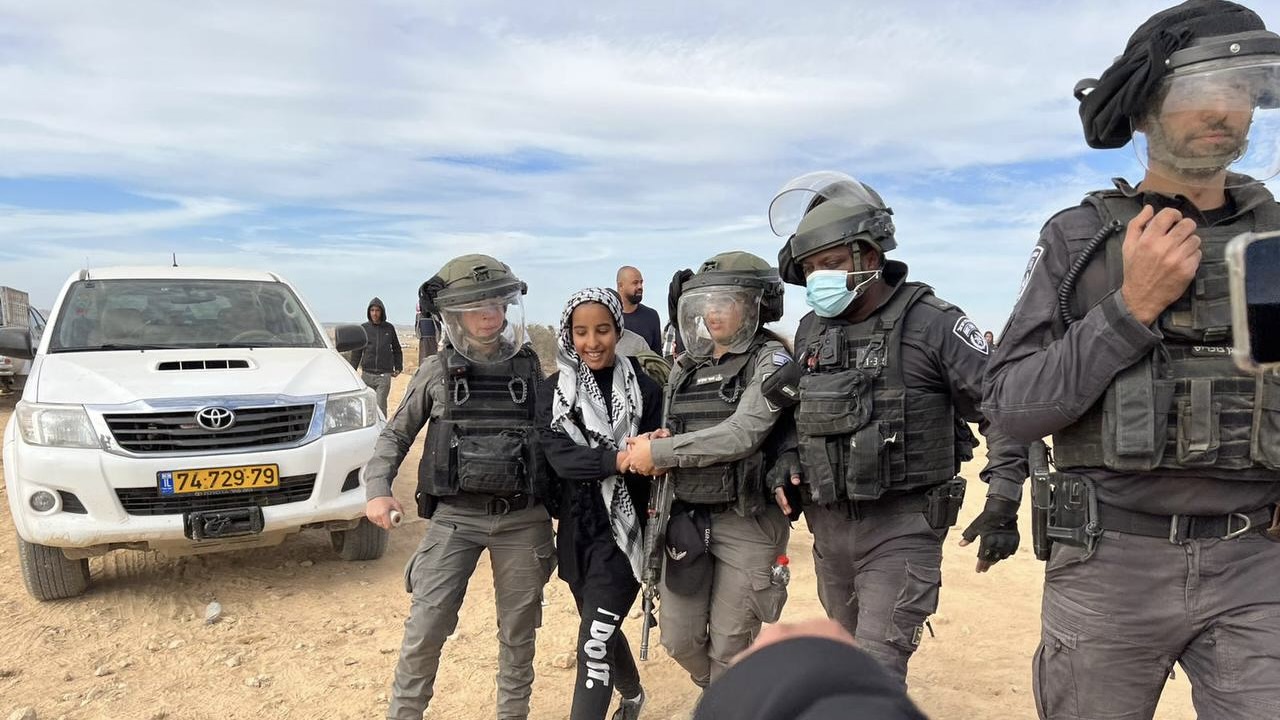Palestinians in the Negev desert have organized vigils and protests to oppose the ongoing Israeli destruction of their lands in the Bedouin villages of Al-Atrash and Al-Sawa. Since the beginning of the week, the villagers have been facing repeated attempts of encroachment by extremist Israeli settlers and right-wing Israeli organizations on their lands.
The right-wing Israeli groups have been forcibly planting trees on the land with the aim of ultimately confiscating and taking complete control of all the Palestinian Bedouin land in the area. The extremists and settlers are being assisted and protected by the Israeli forces who accompanied them with bulldozers to carry out demolitions of Bedouin tents and destroy large swathes of land that the Bedouins have historically used for cultivation.
The Israeli forces have also unleashed brutal violence on the protesting villagers, attacking them with rubber-coated metal bullets, stun grenades, and sound bombs as well as physically assaulting many of them to break up the protests. According to varying new reports, close to 30 protesters have also been arrested since Monday. This includes several under the age of 18, three women, as well as Palestinian journalist Yasser Aqabi, who was covering the Israeli destruction of the village and the violence being inflicted on the villagers.
This isn't about planting trees is it? israeli "police" brutally attack, injure & arrest Palestinians in al-Atrash; run one villager over #Save_Naqab pic.twitter.com/F9sHyxe2jo
— Sarah Wilkinson (@swilkinsonbc) January 12, 2022
Israeli forces reportedly also demolished a residential tent in the nearby al-Ruwais village on Monday, rendering the inhabitants homeless. They have closed off entry to many of the villages in the area and are preventing even the Palestinian Bedouins from accessing their own lands. As a result, the villagers have moved their sit-in protests and vigils to the entry points of their respective villages.
An Israeli settler police officer taking a selfie with a Palestinian Bedouin minor from Al-Atrash and say’s “he’s my arrestee”. It’s like they are counting heads! #انقذوا_النقب #كلنا_الاطرش pic.twitter.com/URIcQzXdVh
— Riya Al (@RiyaAlsanah) January 12, 2022
Following the news of the demolitions and violence, the local Palestinian organization in the area, the Higher Follow Up Committee of Arabs in the Negev announced plans for a large demonstration on Thursday January 13 while also announcing the observation of a general strike in the villages of al-Atrash, al-Sawa, al-Zarnouq, al-Ruwais, Beir Haddaj and Khirbet Watan.
In a statement elaborating on its announcement, the committee said that “we took the decision to undertake proactive measures, beginning with adopting a cumulative resistance program over a period of six months that will lead to a regional general strike and a massive demonstration outside the prime minister’s office, and the internationalization of the issue to expose the racist practices [of Israeli authorities] before international institutions.”
The two Bedouin villages currently under attack and facing the threat of destruction are among 35 similar Palestinian Bedouin villages which are not officially recognized by the state of Israel. Similar demolition operations were also carried out in the villages of al-Mashash, al-Zarnouq, Bier al-Hamam, al-Ruwais, al-Gharaa, and Khirbet Watan last month, during which Israeli forces destroyed crops and agricultural lands.
The non-recognition of these villages by the Israeli government means that they are constantly at risk of demolition and confiscation. This also bars them from receiving any aid or assistance from the Israeli government in terms of infrastructure, electricity, water supply, roads, schools, healthcare etc. This systematic exclusion and abandonment has left the Bedouin Palestinians in these villages, most of which existed before the establishment of the state of Israel in 1948, completely neglected.
The Israeli government works alongside Israeli right-wing and settler organizations to advance its historic “make the desert bloom” campaign which seeks to plant thousands of trees to replace the desert and the Palestinian communities that live there. The Jewish National Fund (JNF), founded by one of the earliest Zionists Theodor Herzl, is one of the primary partners in this campaign which has promoted tree planting in the desert as a way for Jews globally to “support Israel”.
However, this large-scale eviction and ethnic cleansing campaign has been consistently met with mass resistance and protests. Despite constant evacuation and demolition orders from Israeli authorities, the residents of the Palestinian Bedouin villages remain and rebuild. One emblematic case is the village of Al-Araqib, which has been demolished by Israeli forces an astounding 196 times. Village residents have rebuilt and re-erected their tents and homes and recultivated their agricultural crops essential for their livelihood each and every time.





